Yi Jing Hexagram 28 - Line 5
The hexagram: 28
An hexagram is a combination of six yin and yang lines.

28.5 (28 > 32) - THE TÂ KWO HEXAGRAM.
The fifth line, undivided, shows a decayed willow producing flowers, or an old wife in possession of her young husband. There will be occasion neither for blame nor for praise.
Bing DeepL Google Yandex28.5 (28 > 32) - Renovating the facade
One hurries to repair before others notice the decline.
Bing DeepL Google Yandex28.5 (28 > 32) - Renovating the facade
One hurries to repair before others notice the decline.
Bing DeepL Google Yandex28.5 (28 > 32) - Tá kvoh, le grand excès
Tá kvoh : 1. Grand excès, défaut, manquement ; 2. Traverser, dépasser.
Un vieux saule produisant une fleur, une vieille femme épousant un homme encore jeune, quoique non blâmables, ne peuvent être loués. La fleur du vieux saule ne peut durer, l’époux d’une vieille femme peut s’en dégoûter. (Faits qui passent les règles ordinaires.)
Bing DeepL Google Yandex28.5 (28 > 32) - Ravaler la façade
On se dépêche de réparer avant que les autres ne constatent le déclin.
Bing DeepL Google Yandex28.5 (28 > 32) - Lemondás
Igyekszik javítani mielőtt mások észrevennék a hanyatlást.
Bing DeepL Google YandexThe trigrams
The trigrams are combinations of three yin and yang lines. The three bottom lines of the hexagram form the lower trigram and represent the inner situation. The three top lines form the upper trigram and represent the outer situation.
trigSup2


trigInf

The nuclear hexagram: 1.6 (1 > 43)
The nuclear hexagram is the association of the two inner trigrams (lines 2,3,4 and 3,4,5). It represents the root, or the origin of the situation.
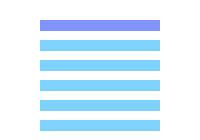
1.6 (1 > 43) - THE KHIEN HEXAGRAM
In the sixth (or topmost) line, undivided, (we see its subject as) the dragon exceeding the proper limits. There will be occasion for repentance.
Bing DeepL Google Yandex1.6 (1 > 43) - Forgetting where ones strength comes from
One can blame oneself for not doing anything when others needed to be heard.
Bing DeepL Google Yandex1.6 (1 > 43) - Forgetting where ones strength comes from
One can blame oneself for not doing anything when others needed to be heard.
Bing DeepL Google Yandex1.6 (1 > 43) - K’ien, la créativité
K’ien : principe actif, force vitale universelle.
S’il devient trop fort et dominant, il y aura lieu de le regretter.
Trop de bonne fortune ne peut durer que si l’on n’est prudent et modéré en tout.
Le principe actif doit céder au principe réceptif à certains moments ou bien les êtres ne se reproduiront pas.
1.6 (1 > 43) - Oublier d'où vient sa force
On peut se reprocher de n'avoir rien fait quand les autres avaient besoin d'être entendus.
Bing DeepL Google YandexThe derived (Fan Yao)
The same line number on the mutated hexagram. It reperesents what can be done AFTER to correct the situation described by this line, as a sort of remedy or solution.
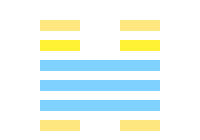
32.5 (32 > 28) - THE HĂNG HEXAGRAM.
The fifth line, divided, shows its subject continuously maintaining the virtue indicated by it. In a wife this will be fortunate ; in a husband, evil.
Bing DeepL Google Yandex32.5 (32 > 28) - Changing of course
One switches activities when necessary, or else one continues.
Bing DeepL Google Yandex32.5 (32 > 28) - Changing of course
One switches activities when necessary, or else one continues.
Bing DeepL Google Yandex32.5 (32 > 28) - Hâng, la durée
Hāng : 1. Constance, permanence, stabilité ; 2. Partout, complètement ; 3. Lune presque pleine.
On doit perpétuer ses vertus ; mais à chacun les siennes, celles du mari ne sont pas celles de l’épouse. [La femme sert un homme et c’est tout jusqu’à sa mort. L’homme décide du droit. Servir une femme ne lui convient pas.]
Bing DeepL Google Yandex32.5 (32 > 28) - Prendre un virage
Changer d'activité en cas de besoin, sinon on continue.
Bing DeepL Google Yandex32.5 (32 > 28) - Kitartás
Váltani kell ha szükséges, egyébként folytatni kell a munkát.
Bing DeepL Google YandexThe juncture: 31.2
The derived of the reciprocal. It represents what could have been done BEFORE to prevent the situation described by this line, as a sort of remedy or solution.

31.2 (31 > 28) - THE HSIEN HEXAGRAM.
The second line, divided, shows one moving the calves of his leg. There will be evil. If he abide (quiet in his place), there will be good fortune.
Bing DeepL Google Yandex31.2 (31 > 28) - K’an et hien, le recrutement, la demande en mariage
K’an et hiēn : 1. Réunir, accorder, ensemble ; 2. Mouvoir, émouvoir le cœur, exciter le sentiment (excitation physique et morale) ; être en mouvement, remuer ; 3. Harmonie, droiture, sincérité.
Remuer les chairs en marchant est une mauvaise contenance. (I. e.
marcher avec tant de hâte et de trouble que la chair de la jambe se remue. Mouvements contraires au juste milieu et à la gravité.)
31.2 (31 > 28) - Rester encore un peu
Les autres ne veulent pas qu'on parte.
Bing DeepL Google YandexThe reciprocal: 28.2
The hexagram upside down. It represents the opposite situation, and as such is insturmental when validating comments.

28.2 (28 > 31) - THE TÂ KWO HEXAGRAM.
The second line, undivided, shows a decayed willow producing shoots, or an old husband in possession of his young wife. There will be advantage in every way.
Bing DeepL Google Yandex28.2 (28 > 31) - Nurturing hope
When one encounters difficulties, one welcomes the weakest to secure their future.
Bing DeepL Google Yandex28.2 (28 > 31) - Nurturing hope
When one encounters difficulties, one welcomes the weakest to secure their future.
Bing DeepL Google Yandex28.2 (28 > 31) - Tá kvoh, le grand excès
Tá kvoh : 1. Grand excès, défaut, manquement ; 2. Traverser, dépasser.
- 2.
28.2 (28 > 31) - Entretenir l'espoir
Quand on rencontre des difficultés, on accueille les plus faibles pour assurer leur avenir.
Bing DeepL Google Yandex28.2 (28 > 31) - Lemondás
Ha valaki nehézségekbe ütközik, emelje fel a leggyengébbet is hogy megőrizhesse jövőjét.
Bing DeepL Google YandexMutations

28.5 (28 > 32) - THE TÂ KWO HEXAGRAM.
The fifth line, undivided, shows a decayed willow producing flowers, or an old wife in possession of her young husband. There will be occasion neither for blame nor for praise.
Bing DeepL Google Yandex28.5 (28 > 32) - Renovating the facade
One hurries to repair before others notice the decline.
Bing DeepL Google Yandex28.5 (28 > 32) - Renovating the facade
One hurries to repair before others notice the decline.
Bing DeepL Google Yandex28.5 (28 > 32) - Tá kvoh, le grand excès
Tá kvoh : 1. Grand excès, défaut, manquement ; 2. Traverser, dépasser.
Un vieux saule produisant une fleur, une vieille femme épousant un homme encore jeune, quoique non blâmables, ne peuvent être loués. La fleur du vieux saule ne peut durer, l’époux d’une vieille femme peut s’en dégoûter. (Faits qui passent les règles ordinaires.)
Bing DeepL Google Yandex28.5 (28 > 32) - Ravaler la façade
On se dépêche de réparer avant que les autres ne constatent le déclin.
Bing DeepL Google Yandex28.5 (28 > 32) - Lemondás
Igyekszik javítani mielőtt mások észrevennék a hanyatlást.
Bing DeepL Google Yandex
28.1.5 (28 > 34) - THE TÂ KWO HEXAGRAM.
- 1. The first line, divided, shows one placing mats of the white mâo grass under things set on the ground. There will be no error.
- 5. The fifth line, undivided, shows a decayed willow producing flowers, or an old wife in possession of her young husband. There will be occasion neither for blame nor for praise.
28.1.5 (28 > 34) - Continuing alone
One asks the weakest to return home to rest and one takes care of the disorder.
Bing DeepL Google Yandex28.1.5 (28 > 34) - Continuing alone
One asks the weakest to return home to rest and one takes care of the disorder.
Bing DeepL Google Yandex28.1.5 (28 > 34) - Tá kvoh, le grand excès
Tá kvoh : 1. Grand excès, défaut, manquement ; 2. Traverser, dépasser.
-
1. Ceci est susceptible de deux explications : a. « S’appuyer sur des joncs » est un grand défaut ; ils plient et ne soutiennent pas. b. Pour placer un objet comme natte à offrande, se servir de mao blanc est fautif.
Note. Au lieu de gratter simplement la terre et l’aplanir.
(Le mao blanc représente la pureté, la droiture, kiet tche. Ceci d’après le commentaire représente un excès de précaution. Kwéh hu weï shin (1er sens). - 5. Un vieux saule produisant une fleur, une vieille femme épousant un homme encore jeune, quoique non blâmables, ne peuvent être loués. La fleur du vieux saule ne peut durer, l’époux d’une vieille femme peut s’en dégoûter. (Faits qui passent les règles ordinaires.)
28.1.5 (28 > 34) - Continuer seul
On demande aux plus faibles de rentrer chez eux pour se reposer et on s’occupe du désordre.
Bing DeepL Google Yandex28.1.5 (28 > 34) - Lemondás
- 1. Fejlődni akar a gyengeség miatt.
- 5. Igyekszik javítani mielőtt mások észrevennék a hanyatlást.
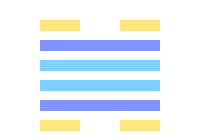
28.2.5 (28 > 62) - THE TÂ KWO HEXAGRAM.
- 2. The second line, undivided, shows a decayed willow producing shoots, or an old husband in possession of his young wife. There will be advantage in every way.
- 5. The fifth line, undivided, shows a decayed willow producing flowers, or an old wife in possession of her young husband. There will be occasion neither for blame nor for praise.
28.2.5 (28 > 62) - Breaking a commitment
One is not ready to solve the problems of others because one went to help one's relatives.
Bing DeepL Google Yandex28.2.5 (28 > 62) - Breaking a commitment
One is not ready to solve the problems of others because one went to help one's relatives.
Bing DeepL Google Yandex28.2.5 (28 > 62) - Tá kvoh, le grand excès
Tá kvoh : 1. Grand excès, défaut, manquement ; 2. Traverser, dépasser.
- 2.
- 5. Un vieux saule produisant une fleur, une vieille femme épousant un homme encore jeune, quoique non blâmables, ne peuvent être loués. La fleur du vieux saule ne peut durer, l’époux d’une vieille femme peut s’en dégoûter. (Faits qui passent les règles ordinaires.)
28.2.5 (28 > 62) - Rompre un engagement
On n’est pas prêt à résoudre les problèmes des autres parce qu’on est parti aider ses proches.
Bing DeepL Google Yandex28.2.5 (28 > 62) - Lemondás
- 2. Ha valaki nehézségekbe ütközik, emelje fel a leggyengébbet is hogy megőrizhesse jövőjét.
- 5. Igyekszik javítani mielőtt mások észrevennék a hanyatlást.
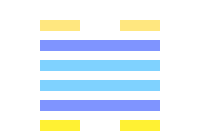
28.1.2.5 (28 > 55) - THE TÂ KWO HEXAGRAM.
- 1. The first line, divided, shows one placing mats of the white mâo grass under things set on the ground. There will be no error.
- 2. The second line, undivided, shows a decayed willow producing shoots, or an old husband in possession of his young wife. There will be advantage in every way.
- 5. The fifth line, undivided, shows a decayed willow producing flowers, or an old wife in possession of her young husband. There will be occasion neither for blame nor for praise.
28.1.2.5 (28 > 55) - Loneliness
One languishes in the expectation of an honest judgment.
Bing DeepL Google Yandex28.1.2.5 (28 > 55) - Loneliness
One languishes in the expectation of an honest judgment.
Bing DeepL Google Yandex28.1.2.5 (28 > 55) - Tá kvoh, le grand excès
Tá kvoh : 1. Grand excès, défaut, manquement ; 2. Traverser, dépasser.
-
1. Ceci est susceptible de deux explications : a. « S’appuyer sur des joncs » est un grand défaut ; ils plient et ne soutiennent pas. b. Pour placer un objet comme natte à offrande, se servir de mao blanc est fautif.
Note. Au lieu de gratter simplement la terre et l’aplanir.
(Le mao blanc représente la pureté, la droiture, kiet tche. Ceci d’après le commentaire représente un excès de précaution. Kwéh hu weï shin (1er sens). - 2.
- 5. Un vieux saule produisant une fleur, une vieille femme épousant un homme encore jeune, quoique non blâmables, ne peuvent être loués. La fleur du vieux saule ne peut durer, l’époux d’une vieille femme peut s’en dégoûter. (Faits qui passent les règles ordinaires.)
28.1.2.5 (28 > 55) - La solitude
On croupit dans l'attente d'un jugement honnête.
Bing DeepL Google Yandex28.1.2.5 (28 > 55) - Lemondás
- 1. Fejlődni akar a gyengeség miatt.
- 2. Ha valaki nehézségekbe ütközik, emelje fel a leggyengébbet is hogy megőrizhesse jövőjét.
- 5. Igyekszik javítani mielőtt mások észrevennék a hanyatlást.
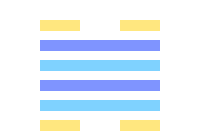
28.3.5 (28 > 40) - THE TÂ KWO HEXAGRAM.
- 3. The third line, undivided, shows a beam that is weak. There will be evil.
- 5. The fifth line, undivided, shows a decayed willow producing flowers, or an old wife in possession of her young husband. There will be occasion neither for blame nor for praise.
28.3.5 (28 > 40) - Making a flop
One becomes the target of mockery when others learn that one has been disappointing.
Bing DeepL Google Yandex28.3.5 (28 > 40) - Making a flop
One becomes the target of mockery when others learn that one has been disappointing.
Bing DeepL Google Yandex28.3.5 (28 > 40) - Tá kvoh, le grand excès
Tá kvoh : 1. Grand excès, défaut, manquement ; 2. Traverser, dépasser.
- 3. Une poutre, un pilier trop faible (voir texte I) sont mauvais (ils ne peuvent supporter) (grand défaut).
- 5. Un vieux saule produisant une fleur, une vieille femme épousant un homme encore jeune, quoique non blâmables, ne peuvent être loués. La fleur du vieux saule ne peut durer, l’époux d’une vieille femme peut s’en dégoûter. (Faits qui passent les règles ordinaires.)
28.3.5 (28 > 40) - Faire un flop
On devient la cible de moqueries quand les autres apprennent qu'on a été décevant.
Bing DeepL Google Yandex28.3.5 (28 > 40) - Lemondás
- 3. Ápolja kapcsolatait.
- 5. Igyekszik javítani mielőtt mások észrevennék a hanyatlást.
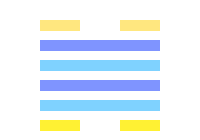
28.1.3.5 (28 > 54) - THE TÂ KWO HEXAGRAM.
- 1. The first line, divided, shows one placing mats of the white mâo grass under things set on the ground. There will be no error.
- 3. The third line, undivided, shows a beam that is weak. There will be evil.
- 5. The fifth line, undivided, shows a decayed willow producing flowers, or an old wife in possession of her young husband. There will be occasion neither for blame nor for praise.
28.1.3.5 (28 > 54) - Losing control
When one is frivolous one does not care about the future of one's children.
Bing DeepL Google Yandex28.1.3.5 (28 > 54) - Losing control
When one is frivolous one does not care about the future of one's children.
Bing DeepL Google Yandex28.1.3.5 (28 > 54) - Tá kvoh, le grand excès
Tá kvoh : 1. Grand excès, défaut, manquement ; 2. Traverser, dépasser.
-
1. Ceci est susceptible de deux explications : a. « S’appuyer sur des joncs » est un grand défaut ; ils plient et ne soutiennent pas. b. Pour placer un objet comme natte à offrande, se servir de mao blanc est fautif.
Note. Au lieu de gratter simplement la terre et l’aplanir.
(Le mao blanc représente la pureté, la droiture, kiet tche. Ceci d’après le commentaire représente un excès de précaution. Kwéh hu weï shin (1er sens). - 3. Une poutre, un pilier trop faible (voir texte I) sont mauvais (ils ne peuvent supporter) (grand défaut).
- 5. Un vieux saule produisant une fleur, une vieille femme épousant un homme encore jeune, quoique non blâmables, ne peuvent être loués. La fleur du vieux saule ne peut durer, l’époux d’une vieille femme peut s’en dégoûter. (Faits qui passent les règles ordinaires.)
28.1.3.5 (28 > 54) - Perdre le contrôle
Quand on est frivole on ne se soucie pas de l'avenir de ses enfants.
Bing DeepL Google Yandex28.1.3.5 (28 > 54) - Lemondás
- 1. Fejlődni akar a gyengeség miatt.
- 3. Ápolja kapcsolatait.
- 5. Igyekszik javítani mielőtt mások észrevennék a hanyatlást.
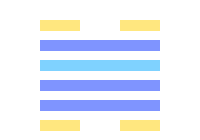
28.2.3.5 (28 > 16) - THE TÂ KWO HEXAGRAM.
- 2. The second line, undivided, shows a decayed willow producing shoots, or an old husband in possession of his young wife. There will be advantage in every way.
- 3. The third line, undivided, shows a beam that is weak. There will be evil.
- 5. The fifth line, undivided, shows a decayed willow producing flowers, or an old wife in possession of her young husband. There will be occasion neither for blame nor for praise.
28.2.3.5 (28 > 16) - Continuing one's training as an assistant.
One hurries to prepare oneself to learn to respond without hesitation.
Bing DeepL Google Yandex28.2.3.5 (28 > 16) - Continuing one's training as an assistant.
One hurries to prepare oneself to learn to respond without hesitation.
Bing DeepL Google Yandex28.2.3.5 (28 > 16) - Tá kvoh, le grand excès
Tá kvoh : 1. Grand excès, défaut, manquement ; 2. Traverser, dépasser.
- 2.
- 3. Une poutre, un pilier trop faible (voir texte I) sont mauvais (ils ne peuvent supporter) (grand défaut).
- 5. Un vieux saule produisant une fleur, une vieille femme épousant un homme encore jeune, quoique non blâmables, ne peuvent être loués. La fleur du vieux saule ne peut durer, l’époux d’une vieille femme peut s’en dégoûter. (Faits qui passent les règles ordinaires.)
28.2.3.5 (28 > 16) - Continuer sa formation d’assistant.
On se dépêche de se préparer pour apprendre à répondre sans hésiter.
Bing DeepL Google Yandex28.2.3.5 (28 > 16) - Lemondás
- 2. Ha valaki nehézségekbe ütközik, emelje fel a leggyengébbet is hogy megőrizhesse jövőjét.
- 3. Ápolja kapcsolatait.
- 5. Igyekszik javítani mielőtt mások észrevennék a hanyatlást.
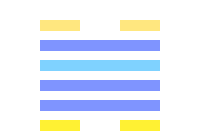
28.1.2.3.5 (28 > 51) - THE TÂ KWO HEXAGRAM.
- 1. The first line, divided, shows one placing mats of the white mâo grass under things set on the ground. There will be no error.
- 2. The second line, undivided, shows a decayed willow producing shoots, or an old husband in possession of his young wife. There will be advantage in every way.
- 3. The third line, undivided, shows a beam that is weak. There will be evil.
- 5. The fifth line, undivided, shows a decayed willow producing flowers, or an old wife in possession of her young husband. There will be occasion neither for blame nor for praise.
28.1.2.3.5 (28 > 51) - Reimbursing down to the last cent
One returns to those who have been dispossessed all the property one has taken from them.
Bing DeepL Google Yandex28.1.2.3.5 (28 > 51) - Reimbursing down to the last cent
One returns to those who have been dispossessed all the property one has taken from them.
Bing DeepL Google Yandex28.1.2.3.5 (28 > 51) - Tá kvoh, le grand excès
Tá kvoh : 1. Grand excès, défaut, manquement ; 2. Traverser, dépasser.
-
1. Ceci est susceptible de deux explications : a. « S’appuyer sur des joncs » est un grand défaut ; ils plient et ne soutiennent pas. b. Pour placer un objet comme natte à offrande, se servir de mao blanc est fautif.
Note. Au lieu de gratter simplement la terre et l’aplanir.
(Le mao blanc représente la pureté, la droiture, kiet tche. Ceci d’après le commentaire représente un excès de précaution. Kwéh hu weï shin (1er sens). - 2.
- 3. Une poutre, un pilier trop faible (voir texte I) sont mauvais (ils ne peuvent supporter) (grand défaut).
- 5. Un vieux saule produisant une fleur, une vieille femme épousant un homme encore jeune, quoique non blâmables, ne peuvent être loués. La fleur du vieux saule ne peut durer, l’époux d’une vieille femme peut s’en dégoûter. (Faits qui passent les règles ordinaires.)
28.1.2.3.5 (28 > 51) - Rembourser jusqu'au dernier centime
On restitue à ceux qui ont été spoliés l'ensemble des biens qu'on leur a pris.
Bing DeepL Google Yandex28.1.2.3.5 (28 > 51) - Lemondás
- 1. Fejlődni akar a gyengeség miatt.
- 2. Ha valaki nehézségekbe ütközik, emelje fel a leggyengébbet is hogy megőrizhesse jövőjét.
- 3. Ápolja kapcsolatait.
- 5. Igyekszik javítani mielőtt mások észrevennék a hanyatlást.

28.4.5 (28 > 46) - THE TÂ KWO HEXAGRAM.
- 4. The fourth line, undivided, shows a beam curving upwards. There will be good fortune. If (the subject of it) looks for other (help but that of line one), there will be cause for regret.
- 5. The fifth line, undivided, shows a decayed willow producing flowers, or an old wife in possession of her young husband. There will be occasion neither for blame nor for praise.
28.4.5 (28 > 46) - Taking a rest
One returns to tell others to stop the work.
Bing DeepL Google Yandex28.4.5 (28 > 46) - Taking a rest
One returns to tell others to stop the work.
Bing DeepL Google Yandex28.4.5 (28 > 46) - Tá kvoh, le grand excès
Tá kvoh : 1. Grand excès, défaut, manquement ; 2. Traverser, dépasser.
- 4. Une colonne haute et forte est bonne ; toute autre est dangereuse (opposition à ce qui précède)
- 5. Un vieux saule produisant une fleur, une vieille femme épousant un homme encore jeune, quoique non blâmables, ne peuvent être loués. La fleur du vieux saule ne peut durer, l’époux d’une vieille femme peut s’en dégoûter. (Faits qui passent les règles ordinaires.)
28.4.5 (28 > 46) - Prendre du repos
On revient pour dire aux autres d'arrêter le travail.
Bing DeepL Google Yandex28.4.5 (28 > 46) - Lemondás
- 4. Mások támogatják de még fel kell épülnie.
- 5. Igyekszik javítani mielőtt mások észrevennék a hanyatlást.

28.1.4.5 (28 > 11) - THE TÂ KWO HEXAGRAM.
- 1. The first line, divided, shows one placing mats of the white mâo grass under things set on the ground. There will be no error.
- 4. The fourth line, undivided, shows a beam curving upwards. There will be good fortune. If (the subject of it) looks for other (help but that of line one), there will be cause for regret.
- 5. The fifth line, undivided, shows a decayed willow producing flowers, or an old wife in possession of her young husband. There will be occasion neither for blame nor for praise.
28.1.4.5 (28 > 11) - Treating the wounded
One cares for those who are condemned to live in the midst of danger.
Bing DeepL Google Yandex28.1.4.5 (28 > 11) - Treating the wounded
One cares for those who are condemned to live in the midst of danger.
Bing DeepL Google Yandex28.1.4.5 (28 > 11) - Tá kvoh, le grand excès
Tá kvoh : 1. Grand excès, défaut, manquement ; 2. Traverser, dépasser.
-
1. Ceci est susceptible de deux explications : a. « S’appuyer sur des joncs » est un grand défaut ; ils plient et ne soutiennent pas. b. Pour placer un objet comme natte à offrande, se servir de mao blanc est fautif.
Note. Au lieu de gratter simplement la terre et l’aplanir.
(Le mao blanc représente la pureté, la droiture, kiet tche. Ceci d’après le commentaire représente un excès de précaution. Kwéh hu weï shin (1er sens). - 4. Une colonne haute et forte est bonne ; toute autre est dangereuse (opposition à ce qui précède)
- 5. Un vieux saule produisant une fleur, une vieille femme épousant un homme encore jeune, quoique non blâmables, ne peuvent être loués. La fleur du vieux saule ne peut durer, l’époux d’une vieille femme peut s’en dégoûter. (Faits qui passent les règles ordinaires.)
28.1.4.5 (28 > 11) - Soigner les blessés
On fait preuve d'égards envers ceux qui sont condamnés à vivre au milieu du danger.
Bing DeepL Google Yandex28.1.4.5 (28 > 11) - Lemondás
- 1. Fejlődni akar a gyengeség miatt.
- 4. Mások támogatják de még fel kell épülnie.
- 5. Igyekszik javítani mielőtt mások észrevennék a hanyatlást.
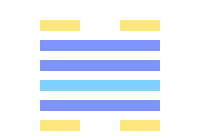
28.2.4.5 (28 > 15) - THE TÂ KWO HEXAGRAM.
- 2. The second line, undivided, shows a decayed willow producing shoots, or an old husband in possession of his young wife. There will be advantage in every way.
- 4. The fourth line, undivided, shows a beam curving upwards. There will be good fortune. If (the subject of it) looks for other (help but that of line one), there will be cause for regret.
- 5. The fifth line, undivided, shows a decayed willow producing flowers, or an old wife in possession of her young husband. There will be occasion neither for blame nor for praise.
28.2.4.5 (28 > 15) - Admitting one's inferiority
One acclaims those who renounce competing for the sake of rectitude.
Bing DeepL Google Yandex28.2.4.5 (28 > 15) - Admitting one's inferiority
One acclaims those who renounce competing for the sake of rectitude.
Bing DeepL Google Yandex28.2.4.5 (28 > 15) - Tá kvoh, le grand excès
Tá kvoh : 1. Grand excès, défaut, manquement ; 2. Traverser, dépasser.
- 2.
- 4. Une colonne haute et forte est bonne ; toute autre est dangereuse (opposition à ce qui précède)
- 5. Un vieux saule produisant une fleur, une vieille femme épousant un homme encore jeune, quoique non blâmables, ne peuvent être loués. La fleur du vieux saule ne peut durer, l’époux d’une vieille femme peut s’en dégoûter. (Faits qui passent les règles ordinaires.)
28.2.4.5 (28 > 15) - Admettre son infériorité
On acclame ceux qui renoncent à concourir par souci de rectitude.
Bing DeepL Google Yandex28.2.4.5 (28 > 15) - Lemondás
- 2. Ha valaki nehézségekbe ütközik, emelje fel a leggyengébbet is hogy megőrizhesse jövőjét.
- 4. Mások támogatják de még fel kell épülnie.
- 5. Igyekszik javítani mielőtt mások észrevennék a hanyatlást.
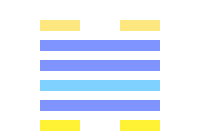
28.1.2.4.5 (28 > 36) - THE TÂ KWO HEXAGRAM.
- 1. The first line, divided, shows one placing mats of the white mâo grass under things set on the ground. There will be no error.
- 2. The second line, undivided, shows a decayed willow producing shoots, or an old husband in possession of his young wife. There will be advantage in every way.
- 4. The fourth line, undivided, shows a beam curving upwards. There will be good fortune. If (the subject of it) looks for other (help but that of line one), there will be cause for regret.
- 5. The fifth line, undivided, shows a decayed willow producing flowers, or an old wife in possession of her young husband. There will be occasion neither for blame nor for praise.
28.1.2.4.5 (28 > 36) - Being unable to make it
One has understood why others did not finish their sentences.
Bing DeepL Google Yandex28.1.2.4.5 (28 > 36) - Being unable to make it
One has understood why others did not finish their sentences.
Bing DeepL Google Yandex28.1.2.4.5 (28 > 36) - Tá kvoh, le grand excès
Tá kvoh : 1. Grand excès, défaut, manquement ; 2. Traverser, dépasser.
-
1. Ceci est susceptible de deux explications : a. « S’appuyer sur des joncs » est un grand défaut ; ils plient et ne soutiennent pas. b. Pour placer un objet comme natte à offrande, se servir de mao blanc est fautif.
Note. Au lieu de gratter simplement la terre et l’aplanir.
(Le mao blanc représente la pureté, la droiture, kiet tche. Ceci d’après le commentaire représente un excès de précaution. Kwéh hu weï shin (1er sens). - 2.
- 4. Une colonne haute et forte est bonne ; toute autre est dangereuse (opposition à ce qui précède)
- 5. Un vieux saule produisant une fleur, une vieille femme épousant un homme encore jeune, quoique non blâmables, ne peuvent être loués. La fleur du vieux saule ne peut durer, l’époux d’une vieille femme peut s’en dégoûter. (Faits qui passent les règles ordinaires.)
28.1.2.4.5 (28 > 36) - Avoir un empêchement
On a compris pourquoi les autres ne terminaient pas leurs phrases.
Bing DeepL Google Yandex28.1.2.4.5 (28 > 36) - Lemondás
- 1. Fejlődni akar a gyengeség miatt.
- 2. Ha valaki nehézségekbe ütközik, emelje fel a leggyengébbet is hogy megőrizhesse jövőjét.
- 4. Mások támogatják de még fel kell épülnie.
- 5. Igyekszik javítani mielőtt mások észrevennék a hanyatlást.

28.3.4.5 (28 > 7) - THE TÂ KWO HEXAGRAM.
- 3. The third line, undivided, shows a beam that is weak. There will be evil.
- 4. The fourth line, undivided, shows a beam curving upwards. There will be good fortune. If (the subject of it) looks for other (help but that of line one), there will be cause for regret.
- 5. The fifth line, undivided, shows a decayed willow producing flowers, or an old wife in possession of her young husband. There will be occasion neither for blame nor for praise.
28.3.4.5 (28 > 7) - Making the journey alone
One wants to produce works without anyone's support.
Bing DeepL Google Yandex28.3.4.5 (28 > 7) - Making the journey alone
One wants to produce works without anyone's support.
Bing DeepL Google Yandex28.3.4.5 (28 > 7) - Tá kvoh, le grand excès
Tá kvoh : 1. Grand excès, défaut, manquement ; 2. Traverser, dépasser.
- 3. Une poutre, un pilier trop faible (voir texte I) sont mauvais (ils ne peuvent supporter) (grand défaut).
- 4. Une colonne haute et forte est bonne ; toute autre est dangereuse (opposition à ce qui précède)
- 5. Un vieux saule produisant une fleur, une vieille femme épousant un homme encore jeune, quoique non blâmables, ne peuvent être loués. La fleur du vieux saule ne peut durer, l’époux d’une vieille femme peut s’en dégoûter. (Faits qui passent les règles ordinaires.)
28.3.4.5 (28 > 7) - Faire la traversée en solitaire
On a envie de réaliser des œuvres sans le soutien de quiconque.
Bing DeepL Google Yandex28.3.4.5 (28 > 7) - Lemondás
- 3. Ápolja kapcsolatait.
- 4. Mások támogatják de még fel kell épülnie.
- 5. Igyekszik javítani mielőtt mások észrevennék a hanyatlást.

28.1.3.4.5 (28 > 19) - THE TÂ KWO HEXAGRAM.
- 1. The first line, divided, shows one placing mats of the white mâo grass under things set on the ground. There will be no error.
- 3. The third line, undivided, shows a beam that is weak. There will be evil.
- 4. The fourth line, undivided, shows a beam curving upwards. There will be good fortune. If (the subject of it) looks for other (help but that of line one), there will be cause for regret.
- 5. The fifth line, undivided, shows a decayed willow producing flowers, or an old wife in possession of her young husband. There will be occasion neither for blame nor for praise.
28.1.3.4.5 (28 > 19) - Adapting to one's needs
One recalibrates an instrument designed for other uses.
Bing DeepL Google Yandex28.1.3.4.5 (28 > 19) - Adapting to one's needs
One recalibrates an instrument designed for other uses.
Bing DeepL Google Yandex28.1.3.4.5 (28 > 19) - Tá kvoh, le grand excès
Tá kvoh : 1. Grand excès, défaut, manquement ; 2. Traverser, dépasser.
-
1. Ceci est susceptible de deux explications : a. « S’appuyer sur des joncs » est un grand défaut ; ils plient et ne soutiennent pas. b. Pour placer un objet comme natte à offrande, se servir de mao blanc est fautif.
Note. Au lieu de gratter simplement la terre et l’aplanir.
(Le mao blanc représente la pureté, la droiture, kiet tche. Ceci d’après le commentaire représente un excès de précaution. Kwéh hu weï shin (1er sens). - 3. Une poutre, un pilier trop faible (voir texte I) sont mauvais (ils ne peuvent supporter) (grand défaut).
- 4. Une colonne haute et forte est bonne ; toute autre est dangereuse (opposition à ce qui précède)
- 5. Un vieux saule produisant une fleur, une vieille femme épousant un homme encore jeune, quoique non blâmables, ne peuvent être loués. La fleur du vieux saule ne peut durer, l’époux d’une vieille femme peut s’en dégoûter. (Faits qui passent les règles ordinaires.)
28.1.3.4.5 (28 > 19) - Adapter à ses besoins
On recalibre un instrument conçu pour d'autres emplois.
Bing DeepL Google Yandex28.1.3.4.5 (28 > 19) - Lemondás
- 1. Fejlődni akar a gyengeség miatt.
- 3. Ápolja kapcsolatait.
- 4. Mások támogatják de még fel kell épülnie.
- 5. Igyekszik javítani mielőtt mások észrevennék a hanyatlást.
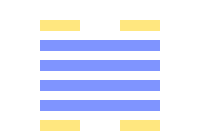
28.2.3.4.5 (28 > 2) - THE TÂ KWO HEXAGRAM.
- 2. The second line, undivided, shows a decayed willow producing shoots, or an old husband in possession of his young wife. There will be advantage in every way.
- 3. The third line, undivided, shows a beam that is weak. There will be evil.
- 4. The fourth line, undivided, shows a beam curving upwards. There will be good fortune. If (the subject of it) looks for other (help but that of line one), there will be cause for regret.
- 5. The fifth line, undivided, shows a decayed willow producing flowers, or an old wife in possession of her young husband. There will be occasion neither for blame nor for praise.
28.2.3.4.5 (28 > 2) - Going all out
One is going to do the best one can so that others are impressed.
Bing DeepL Google Yandex28.2.3.4.5 (28 > 2) - Going all out
One is going to do the best one can so that others are impressed.
Bing DeepL Google Yandex28.2.3.4.5 (28 > 2) - Tá kvoh, le grand excès
Tá kvoh : 1. Grand excès, défaut, manquement ; 2. Traverser, dépasser.
- 2.
- 3. Une poutre, un pilier trop faible (voir texte I) sont mauvais (ils ne peuvent supporter) (grand défaut).
- 4. Une colonne haute et forte est bonne ; toute autre est dangereuse (opposition à ce qui précède)
- 5. Un vieux saule produisant une fleur, une vieille femme épousant un homme encore jeune, quoique non blâmables, ne peuvent être loués. La fleur du vieux saule ne peut durer, l’époux d’une vieille femme peut s’en dégoûter. (Faits qui passent les règles ordinaires.)
28.2.3.4.5 (28 > 2) - Sortir le grand jeu
On va faire du mieux qu’on peut pour que les autres soient impressionnés.
Bing DeepL Google Yandex28.2.3.4.5 (28 > 2) - Lemondás
- 2. Ha valaki nehézségekbe ütközik, emelje fel a leggyengébbet is hogy megőrizhesse jövőjét.
- 3. Ápolja kapcsolatait.
- 4. Mások támogatják de még fel kell épülnie.
- 5. Igyekszik javítani mielőtt mások észrevennék a hanyatlást.
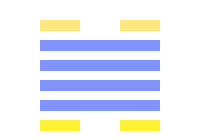
28.1.2.3.4.5 (28 > 24) - THE TÂ KWO HEXAGRAM.
- 1. The first line, divided, shows one placing mats of the white mâo grass under things set on the ground. There will be no error.
- 2. The second line, undivided, shows a decayed willow producing shoots, or an old husband in possession of his young wife. There will be advantage in every way.
- 3. The third line, undivided, shows a beam that is weak. There will be evil.
- 4. The fourth line, undivided, shows a beam curving upwards. There will be good fortune. If (the subject of it) looks for other (help but that of line one), there will be cause for regret.
- 5. The fifth line, undivided, shows a decayed willow producing flowers, or an old wife in possession of her young husband. There will be occasion neither for blame nor for praise.
28.1.2.3.4.5 (28 > 24) - Speaking without taboos
One is referring to practices that have become illegal.
Bing DeepL Google Yandex28.1.2.3.4.5 (28 > 24) - Speaking without taboos
One is referring to practices that have become illegal.
Bing DeepL Google Yandex28.1.2.3.4.5 (28 > 24) - Tá kvoh, le grand excès
Tá kvoh : 1. Grand excès, défaut, manquement ; 2. Traverser, dépasser.
-
1. Ceci est susceptible de deux explications : a. « S’appuyer sur des joncs » est un grand défaut ; ils plient et ne soutiennent pas. b. Pour placer un objet comme natte à offrande, se servir de mao blanc est fautif.
Note. Au lieu de gratter simplement la terre et l’aplanir.
(Le mao blanc représente la pureté, la droiture, kiet tche. Ceci d’après le commentaire représente un excès de précaution. Kwéh hu weï shin (1er sens). - 2.
- 3. Une poutre, un pilier trop faible (voir texte I) sont mauvais (ils ne peuvent supporter) (grand défaut).
- 4. Une colonne haute et forte est bonne ; toute autre est dangereuse (opposition à ce qui précède)
- 5. Un vieux saule produisant une fleur, une vieille femme épousant un homme encore jeune, quoique non blâmables, ne peuvent être loués. La fleur du vieux saule ne peut durer, l’époux d’une vieille femme peut s’en dégoûter. (Faits qui passent les règles ordinaires.)
28.1.2.3.4.5 (28 > 24) - Parler sans tabous
On se réfère à des pratiques devenues illicites.
Bing DeepL Google Yandex28.1.2.3.4.5 (28 > 24) - Lemondás
- 1. Fejlődni akar a gyengeség miatt.
- 2. Ha valaki nehézségekbe ütközik, emelje fel a leggyengébbet is hogy megőrizhesse jövőjét.
- 3. Ápolja kapcsolatait.
- 4. Mások támogatják de még fel kell épülnie.
- 5. Igyekszik javítani mielőtt mások észrevennék a hanyatlást.

28.5.6 (28 > 50) - THE TÂ KWO HEXAGRAM.
- 5. The fifth line, undivided, shows a decayed willow producing flowers, or an old wife in possession of her young husband. There will be occasion neither for blame nor for praise.
- 6. The topmost line, divided, shows its subject with extraordinary (boldness) wading through a stream, till the water hides the crown of his head. There will be evil, but no ground for blame.
28.5.6 (28 > 50) - Responding to an emergency
One rushes things when one needs results immediately.
Bing DeepL Google Yandex28.5.6 (28 > 50) - Responding to an emergency
One rushes things when one needs results immediately.
Bing DeepL Google Yandex28.5.6 (28 > 50) - Tá kvoh, le grand excès
Tá kvoh : 1. Grand excès, défaut, manquement ; 2. Traverser, dépasser.
- 5. Un vieux saule produisant une fleur, une vieille femme épousant un homme encore jeune, quoique non blâmables, ne peuvent être loués. La fleur du vieux saule ne peut durer, l’époux d’une vieille femme peut s’en dégoûter. (Faits qui passent les règles ordinaires.)
- 6. Traversant un fleuve, y entrer jusqu’au sommet de la tête est chose dangereuse, (mais peut n’être point blâmable, si on le fait pour aider quelqu’un, d’après le Com.) (3e sens). Force défaillante.
28.5.6 (28 > 50) - Répondre à une urgence
On va très vite en besogne quand on a besoin de résultats immédiatement.
Bing DeepL Google Yandex28.5.6 (28 > 50) - Lemondás
- 5. Igyekszik javítani mielőtt mások észrevennék a hanyatlást.
- 6. Egyedül akar haladni a környezők gyengesége miatt.
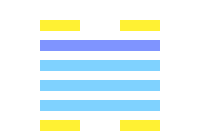
28.1.5.6 (28 > 14) - THE TÂ KWO HEXAGRAM.
- 1. The first line, divided, shows one placing mats of the white mâo grass under things set on the ground. There will be no error.
- 5. The fifth line, undivided, shows a decayed willow producing flowers, or an old wife in possession of her young husband. There will be occasion neither for blame nor for praise.
- 6. The topmost line, divided, shows its subject with extraordinary (boldness) wading through a stream, till the water hides the crown of his head. There will be evil, but no ground for blame.
28.1.5.6 (28 > 14) - Regretting afterwards
One has admitted one's faults despite the absence of those who would have liked to hear it.
Bing DeepL Google Yandex28.1.5.6 (28 > 14) - Regretting afterwards
One has admitted one's faults despite the absence of those who would have liked to hear it.
Bing DeepL Google Yandex28.1.5.6 (28 > 14) - Tá kvoh, le grand excès
Tá kvoh : 1. Grand excès, défaut, manquement ; 2. Traverser, dépasser.
-
1. Ceci est susceptible de deux explications : a. « S’appuyer sur des joncs » est un grand défaut ; ils plient et ne soutiennent pas. b. Pour placer un objet comme natte à offrande, se servir de mao blanc est fautif.
Note. Au lieu de gratter simplement la terre et l’aplanir.
(Le mao blanc représente la pureté, la droiture, kiet tche. Ceci d’après le commentaire représente un excès de précaution. Kwéh hu weï shin (1er sens). - 5. Un vieux saule produisant une fleur, une vieille femme épousant un homme encore jeune, quoique non blâmables, ne peuvent être loués. La fleur du vieux saule ne peut durer, l’époux d’une vieille femme peut s’en dégoûter. (Faits qui passent les règles ordinaires.)
- 6. Traversant un fleuve, y entrer jusqu’au sommet de la tête est chose dangereuse, (mais peut n’être point blâmable, si on le fait pour aider quelqu’un, d’après le Com.) (3e sens). Force défaillante.
28.1.5.6 (28 > 14) - Regretter après-coup
On a reconnu ses fautes en dépit de l'absence de ceux qui auraient voulu l'entendre.
Bing DeepL Google Yandex28.1.5.6 (28 > 14) - Lemondás
- 1. Fejlődni akar a gyengeség miatt.
- 5. Igyekszik javítani mielőtt mások észrevennék a hanyatlást.
- 6. Egyedül akar haladni a környezők gyengesége miatt.
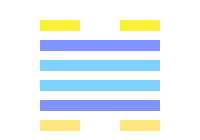
28.2.5.6 (28 > 56) - THE TÂ KWO HEXAGRAM.
- 2. The second line, undivided, shows a decayed willow producing shoots, or an old husband in possession of his young wife. There will be advantage in every way.
- 5. The fifth line, undivided, shows a decayed willow producing flowers, or an old wife in possession of her young husband. There will be occasion neither for blame nor for praise.
- 6. The topmost line, divided, shows its subject with extraordinary (boldness) wading through a stream, till the water hides the crown of his head. There will be evil, but no ground for blame.
28.2.5.6 (28 > 56) - Calling to order
One huffs and puffs by wanting too much to tell others what they have to do.
Bing DeepL Google Yandex28.2.5.6 (28 > 56) - Calling to order
One huffs and puffs by wanting too much to tell others what they have to do.
Bing DeepL Google Yandex28.2.5.6 (28 > 56) - Tá kvoh, le grand excès
Tá kvoh : 1. Grand excès, défaut, manquement ; 2. Traverser, dépasser.
- 2.
- 5. Un vieux saule produisant une fleur, une vieille femme épousant un homme encore jeune, quoique non blâmables, ne peuvent être loués. La fleur du vieux saule ne peut durer, l’époux d’une vieille femme peut s’en dégoûter. (Faits qui passent les règles ordinaires.)
- 6. Traversant un fleuve, y entrer jusqu’au sommet de la tête est chose dangereuse, (mais peut n’être point blâmable, si on le fait pour aider quelqu’un, d’après le Com.) (3e sens). Force défaillante.
28.2.5.6 (28 > 56) - Rappeler à l'ordre
On s'époumone à force de vouloir dire aux autres ce qu'ils doivent faire.
Bing DeepL Google Yandex28.2.5.6 (28 > 56) - Lemondás
- 2. Ha valaki nehézségekbe ütközik, emelje fel a leggyengébbet is hogy megőrizhesse jövőjét.
- 5. Igyekszik javítani mielőtt mások észrevennék a hanyatlást.
- 6. Egyedül akar haladni a környezők gyengesége miatt.
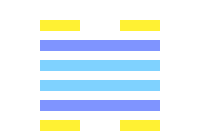
28.1.2.5.6 (28 > 30) - THE TÂ KWO HEXAGRAM.
- 1. The first line, divided, shows one placing mats of the white mâo grass under things set on the ground. There will be no error.
- 2. The second line, undivided, shows a decayed willow producing shoots, or an old husband in possession of his young wife. There will be advantage in every way.
- 5. The fifth line, undivided, shows a decayed willow producing flowers, or an old wife in possession of her young husband. There will be occasion neither for blame nor for praise.
- 6. The topmost line, divided, shows its subject with extraordinary (boldness) wading through a stream, till the water hides the crown of his head. There will be evil, but no ground for blame.
28.1.2.5.6 (28 > 30) - Dismantling the resistance
One triumphs over all one's opponents by striking a fatal blow to their projects.
Bing DeepL Google Yandex28.1.2.5.6 (28 > 30) - Dismantling the resistance
One triumphs over all one's opponents by striking a fatal blow to their projects.
Bing DeepL Google Yandex28.1.2.5.6 (28 > 30) - Tá kvoh, le grand excès
Tá kvoh : 1. Grand excès, défaut, manquement ; 2. Traverser, dépasser.
-
1. Ceci est susceptible de deux explications : a. « S’appuyer sur des joncs » est un grand défaut ; ils plient et ne soutiennent pas. b. Pour placer un objet comme natte à offrande, se servir de mao blanc est fautif.
Note. Au lieu de gratter simplement la terre et l’aplanir.
(Le mao blanc représente la pureté, la droiture, kiet tche. Ceci d’après le commentaire représente un excès de précaution. Kwéh hu weï shin (1er sens). - 2.
- 5. Un vieux saule produisant une fleur, une vieille femme épousant un homme encore jeune, quoique non blâmables, ne peuvent être loués. La fleur du vieux saule ne peut durer, l’époux d’une vieille femme peut s’en dégoûter. (Faits qui passent les règles ordinaires.)
- 6. Traversant un fleuve, y entrer jusqu’au sommet de la tête est chose dangereuse, (mais peut n’être point blâmable, si on le fait pour aider quelqu’un, d’après le Com.) (3e sens). Force défaillante.
28.1.2.5.6 (28 > 30) - Démanteler la résistance
On triomphe de tous ses opposants en portant un coup fatal à leurs projets.
Bing DeepL Google Yandex28.1.2.5.6 (28 > 30) - Lemondás
- 1. Fejlődni akar a gyengeség miatt.
- 2. Ha valaki nehézségekbe ütközik, emelje fel a leggyengébbet is hogy megőrizhesse jövőjét.
- 5. Igyekszik javítani mielőtt mások észrevennék a hanyatlást.
- 6. Egyedül akar haladni a környezők gyengesége miatt.
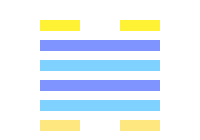
28.3.5.6 (28 > 64) - THE TÂ KWO HEXAGRAM.
- 3. The third line, undivided, shows a beam that is weak. There will be evil.
- 5. The fifth line, undivided, shows a decayed willow producing flowers, or an old wife in possession of her young husband. There will be occasion neither for blame nor for praise.
- 6. The topmost line, divided, shows its subject with extraordinary (boldness) wading through a stream, till the water hides the crown of his head. There will be evil, but no ground for blame.
28.3.5.6 (28 > 64) - Becoming unbearable
One always finds something to criticise when others are not friends.
Bing DeepL Google Yandex28.3.5.6 (28 > 64) - Becoming unbearable
One always finds something to criticize when others are not friends.
Bing DeepL Google Yandex28.3.5.6 (28 > 64) - Tá kvoh, le grand excès
Tá kvoh : 1. Grand excès, défaut, manquement ; 2. Traverser, dépasser.
- 3. Une poutre, un pilier trop faible (voir texte I) sont mauvais (ils ne peuvent supporter) (grand défaut).
- 5. Un vieux saule produisant une fleur, une vieille femme épousant un homme encore jeune, quoique non blâmables, ne peuvent être loués. La fleur du vieux saule ne peut durer, l’époux d’une vieille femme peut s’en dégoûter. (Faits qui passent les règles ordinaires.)
- 6. Traversant un fleuve, y entrer jusqu’au sommet de la tête est chose dangereuse, (mais peut n’être point blâmable, si on le fait pour aider quelqu’un, d’après le Com.) (3e sens). Force défaillante.
28.3.5.6 (28 > 64) - Devenir insupportable
On trouve toujours quelque chose à critiquer quand les autres ne sont pas des amis.
Bing DeepL Google Yandex28.3.5.6 (28 > 64) - Lemondás
- 3. Ápolja kapcsolatait.
- 5. Igyekszik javítani mielőtt mások észrevennék a hanyatlást.
- 6. Egyedül akar haladni a környezők gyengesége miatt.
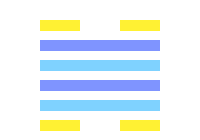
28.1.3.5.6 (28 > 38) - THE TÂ KWO HEXAGRAM.
- 1. The first line, divided, shows one placing mats of the white mâo grass under things set on the ground. There will be no error.
- 3. The third line, undivided, shows a beam that is weak. There will be evil.
- 5. The fifth line, undivided, shows a decayed willow producing flowers, or an old wife in possession of her young husband. There will be occasion neither for blame nor for praise.
- 6. The topmost line, divided, shows its subject with extraordinary (boldness) wading through a stream, till the water hides the crown of his head. There will be evil, but no ground for blame.
28.1.3.5.6 (28 > 38) - Wanting the happiness of one' s family
One wishes to have more power to surround one's relatives with benefits.
Bing DeepL Google Yandex28.1.3.5.6 (28 > 38) - Wanting the happiness of one' s family
One wishes to have more power to surround one's relatives with benefits.
Bing DeepL Google Yandex28.1.3.5.6 (28 > 38) - Tá kvoh, le grand excès
Tá kvoh : 1. Grand excès, défaut, manquement ; 2. Traverser, dépasser.
-
1. Ceci est susceptible de deux explications : a. « S’appuyer sur des joncs » est un grand défaut ; ils plient et ne soutiennent pas. b. Pour placer un objet comme natte à offrande, se servir de mao blanc est fautif.
Note. Au lieu de gratter simplement la terre et l’aplanir.
(Le mao blanc représente la pureté, la droiture, kiet tche. Ceci d’après le commentaire représente un excès de précaution. Kwéh hu weï shin (1er sens). - 3. Une poutre, un pilier trop faible (voir texte I) sont mauvais (ils ne peuvent supporter) (grand défaut).
- 5. Un vieux saule produisant une fleur, une vieille femme épousant un homme encore jeune, quoique non blâmables, ne peuvent être loués. La fleur du vieux saule ne peut durer, l’époux d’une vieille femme peut s’en dégoûter. (Faits qui passent les règles ordinaires.)
- 6. Traversant un fleuve, y entrer jusqu’au sommet de la tête est chose dangereuse, (mais peut n’être point blâmable, si on le fait pour aider quelqu’un, d’après le Com.) (3e sens). Force défaillante.
28.1.3.5.6 (28 > 38) - Vouloir le bonheur des siens
On souhaite avoir davantage de pouvoir pour entourer ses proches de bienfaits.
Bing DeepL Google Yandex28.1.3.5.6 (28 > 38) - Lemondás
- 1. Fejlődni akar a gyengeség miatt.
- 3. Ápolja kapcsolatait.
- 5. Igyekszik javítani mielőtt mások észrevennék a hanyatlást.
- 6. Egyedül akar haladni a környezők gyengesége miatt.
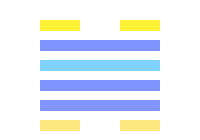
28.2.3.5.6 (28 > 35) - THE TÂ KWO HEXAGRAM.
- 2. The second line, undivided, shows a decayed willow producing shoots, or an old husband in possession of his young wife. There will be advantage in every way.
- 3. The third line, undivided, shows a beam that is weak. There will be evil.
- 5. The fifth line, undivided, shows a decayed willow producing flowers, or an old wife in possession of her young husband. There will be occasion neither for blame nor for praise.
- 6. The topmost line, divided, shows its subject with extraordinary (boldness) wading through a stream, till the water hides the crown of his head. There will be evil, but no ground for blame.
28.2.3.5.6 (28 > 35) - Being blunt
One fiddles confidently with very fragile objects.
Bing DeepL Google Yandex28.2.3.5.6 (28 > 35) - Being blunt
One fiddles confidently with very fragile objects.
Bing DeepL Google Yandex28.2.3.5.6 (28 > 35) - Tá kvoh, le grand excès
Tá kvoh : 1. Grand excès, défaut, manquement ; 2. Traverser, dépasser.
- 2.
- 3. Une poutre, un pilier trop faible (voir texte I) sont mauvais (ils ne peuvent supporter) (grand défaut).
- 5. Un vieux saule produisant une fleur, une vieille femme épousant un homme encore jeune, quoique non blâmables, ne peuvent être loués. La fleur du vieux saule ne peut durer, l’époux d’une vieille femme peut s’en dégoûter. (Faits qui passent les règles ordinaires.)
- 6. Traversant un fleuve, y entrer jusqu’au sommet de la tête est chose dangereuse, (mais peut n’être point blâmable, si on le fait pour aider quelqu’un, d’après le Com.) (3e sens). Force défaillante.
28.2.3.5.6 (28 > 35) - Ne pas prendre de pincettes
On tripote avec assurance des objets très fragiles.
Bing DeepL Google Yandex28.2.3.5.6 (28 > 35) - Lemondás
- 2. Ha valaki nehézségekbe ütközik, emelje fel a leggyengébbet is hogy megőrizhesse jövőjét.
- 3. Ápolja kapcsolatait.
- 5. Igyekszik javítani mielőtt mások észrevennék a hanyatlást.
- 6. Egyedül akar haladni a környezők gyengesége miatt.
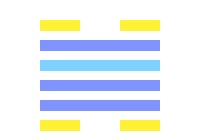
28.1.2.3.5.6 (28 > 21) - THE TÂ KWO HEXAGRAM.
- 1. The first line, divided, shows one placing mats of the white mâo grass under things set on the ground. There will be no error.
- 2. The second line, undivided, shows a decayed willow producing shoots, or an old husband in possession of his young wife. There will be advantage in every way.
- 3. The third line, undivided, shows a beam that is weak. There will be evil.
- 5. The fifth line, undivided, shows a decayed willow producing flowers, or an old wife in possession of her young husband. There will be occasion neither for blame nor for praise.
- 6. The topmost line, divided, shows its subject with extraordinary (boldness) wading through a stream, till the water hides the crown of his head. There will be evil, but no ground for blame.
28.1.2.3.5.6 (28 > 21) - Seeking asylum
One finds refuge among those who have been able to win the most seasoned.
Bing DeepL Google Yandex28.1.2.3.5.6 (28 > 21) - Seeking asylum
One finds refuge among those who have been able to win the most seasoned.
Bing DeepL Google Yandex28.1.2.3.5.6 (28 > 21) - Tá kvoh, le grand excès
Tá kvoh : 1. Grand excès, défaut, manquement ; 2. Traverser, dépasser.
-
1. Ceci est susceptible de deux explications : a. « S’appuyer sur des joncs » est un grand défaut ; ils plient et ne soutiennent pas. b. Pour placer un objet comme natte à offrande, se servir de mao blanc est fautif.
Note. Au lieu de gratter simplement la terre et l’aplanir.
(Le mao blanc représente la pureté, la droiture, kiet tche. Ceci d’après le commentaire représente un excès de précaution. Kwéh hu weï shin (1er sens). - 2.
- 3. Une poutre, un pilier trop faible (voir texte I) sont mauvais (ils ne peuvent supporter) (grand défaut).
- 5. Un vieux saule produisant une fleur, une vieille femme épousant un homme encore jeune, quoique non blâmables, ne peuvent être loués. La fleur du vieux saule ne peut durer, l’époux d’une vieille femme peut s’en dégoûter. (Faits qui passent les règles ordinaires.)
- 6. Traversant un fleuve, y entrer jusqu’au sommet de la tête est chose dangereuse, (mais peut n’être point blâmable, si on le fait pour aider quelqu’un, d’après le Com.) (3e sens). Force défaillante.
28.1.2.3.5.6 (28 > 21) - Faire une demande d'asile
On trouve refuge auprès de ceux qui ont pu vaincre les plus aguerris.
Bing DeepL Google Yandex28.1.2.3.5.6 (28 > 21) - Lemondás
- 1. Fejlődni akar a gyengeség miatt.
- 2. Ha valaki nehézségekbe ütközik, emelje fel a leggyengébbet is hogy megőrizhesse jövőjét.
- 3. Ápolja kapcsolatait.
- 5. Igyekszik javítani mielőtt mások észrevennék a hanyatlást.
- 6. Egyedül akar haladni a környezők gyengesége miatt.

28.4.5.6 (28 > 18) - THE TÂ KWO HEXAGRAM.
- 4. The fourth line, undivided, shows a beam curving upwards. There will be good fortune. If (the subject of it) looks for other (help but that of line one), there will be cause for regret.
- 5. The fifth line, undivided, shows a decayed willow producing flowers, or an old wife in possession of her young husband. There will be occasion neither for blame nor for praise.
- 6. The topmost line, divided, shows its subject with extraordinary (boldness) wading through a stream, till the water hides the crown of his head. There will be evil, but no ground for blame.
28.4.5.6 (28 > 18) - Signing a discharge
One steps back to let the most competent take the matter in hand.
Bing DeepL Google Yandex28.4.5.6 (28 > 18) - Signing a discharge
One steps back to let the most competent take the matter in hand.
Bing DeepL Google Yandex28.4.5.6 (28 > 18) - Tá kvoh, le grand excès
Tá kvoh : 1. Grand excès, défaut, manquement ; 2. Traverser, dépasser.
- 4. Une colonne haute et forte est bonne ; toute autre est dangereuse (opposition à ce qui précède)
- 5. Un vieux saule produisant une fleur, une vieille femme épousant un homme encore jeune, quoique non blâmables, ne peuvent être loués. La fleur du vieux saule ne peut durer, l’époux d’une vieille femme peut s’en dégoûter. (Faits qui passent les règles ordinaires.)
- 6. Traversant un fleuve, y entrer jusqu’au sommet de la tête est chose dangereuse, (mais peut n’être point blâmable, si on le fait pour aider quelqu’un, d’après le Com.) (3e sens). Force défaillante.
28.4.5.6 (28 > 18) - Signer une décharge
On recule pour laisser les plus compétents prendre les choses en main.
Bing DeepL Google Yandex28.4.5.6 (28 > 18) - Lemondás
- 4. Mások támogatják de még fel kell épülnie.
- 5. Igyekszik javítani mielőtt mások észrevennék a hanyatlást.
- 6. Egyedül akar haladni a környezők gyengesége miatt.
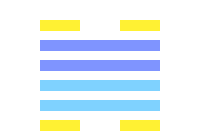
28.1.4.5.6 (28 > 26) - THE TÂ KWO HEXAGRAM.
- 1. The first line, divided, shows one placing mats of the white mâo grass under things set on the ground. There will be no error.
- 4. The fourth line, undivided, shows a beam curving upwards. There will be good fortune. If (the subject of it) looks for other (help but that of line one), there will be cause for regret.
- 5. The fifth line, undivided, shows a decayed willow producing flowers, or an old wife in possession of her young husband. There will be occasion neither for blame nor for praise.
- 6. The topmost line, divided, shows its subject with extraordinary (boldness) wading through a stream, till the water hides the crown of his head. There will be evil, but no ground for blame.
28.1.4.5.6 (28 > 26) - Becoming an expert
One studies minutely a work that others have created.
Bing DeepL Google Yandex28.1.4.5.6 (28 > 26) - Becoming an expert
One studies minutely a work that others have created.
Bing DeepL Google Yandex28.1.4.5.6 (28 > 26) - Tá kvoh, le grand excès
Tá kvoh : 1. Grand excès, défaut, manquement ; 2. Traverser, dépasser.
-
1. Ceci est susceptible de deux explications : a. « S’appuyer sur des joncs » est un grand défaut ; ils plient et ne soutiennent pas. b. Pour placer un objet comme natte à offrande, se servir de mao blanc est fautif.
Note. Au lieu de gratter simplement la terre et l’aplanir.
(Le mao blanc représente la pureté, la droiture, kiet tche. Ceci d’après le commentaire représente un excès de précaution. Kwéh hu weï shin (1er sens). - 4. Une colonne haute et forte est bonne ; toute autre est dangereuse (opposition à ce qui précède)
- 5. Un vieux saule produisant une fleur, une vieille femme épousant un homme encore jeune, quoique non blâmables, ne peuvent être loués. La fleur du vieux saule ne peut durer, l’époux d’une vieille femme peut s’en dégoûter. (Faits qui passent les règles ordinaires.)
- 6. Traversant un fleuve, y entrer jusqu’au sommet de la tête est chose dangereuse, (mais peut n’être point blâmable, si on le fait pour aider quelqu’un, d’après le Com.) (3e sens). Force défaillante.
28.1.4.5.6 (28 > 26) - Devenir un expert
On étudie dans ses moindres détails une œuvre que les autres ont réalisée.
Bing DeepL Google Yandex28.1.4.5.6 (28 > 26) - Lemondás
- 1. Fejlődni akar a gyengeség miatt.
- 4. Mások támogatják de még fel kell épülnie.
- 5. Igyekszik javítani mielőtt mások észrevennék a hanyatlást.
- 6. Egyedül akar haladni a környezők gyengesége miatt.
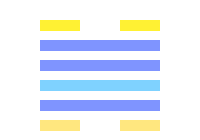
28.2.4.5.6 (28 > 52) - THE TÂ KWO HEXAGRAM.
- 2. The second line, undivided, shows a decayed willow producing shoots, or an old husband in possession of his young wife. There will be advantage in every way.
- 4. The fourth line, undivided, shows a beam curving upwards. There will be good fortune. If (the subject of it) looks for other (help but that of line one), there will be cause for regret.
- 5. The fifth line, undivided, shows a decayed willow producing flowers, or an old wife in possession of her young husband. There will be occasion neither for blame nor for praise.
- 6. The topmost line, divided, shows its subject with extraordinary (boldness) wading through a stream, till the water hides the crown of his head. There will be evil, but no ground for blame.
28.2.4.5.6 (28 > 52) - Lending consumables
One borrows an object without any guarantee of being able to return it intact.
Bing DeepL Google Yandex28.2.4.5.6 (28 > 52) - Lending consumables
One borrows an object without any guarantee of being able to return it intact.
Bing DeepL Google Yandex28.2.4.5.6 (28 > 52) - Tá kvoh, le grand excès
Tá kvoh : 1. Grand excès, défaut, manquement ; 2. Traverser, dépasser.
- 2.
- 4. Une colonne haute et forte est bonne ; toute autre est dangereuse (opposition à ce qui précède)
- 5. Un vieux saule produisant une fleur, une vieille femme épousant un homme encore jeune, quoique non blâmables, ne peuvent être loués. La fleur du vieux saule ne peut durer, l’époux d’une vieille femme peut s’en dégoûter. (Faits qui passent les règles ordinaires.)
- 6. Traversant un fleuve, y entrer jusqu’au sommet de la tête est chose dangereuse, (mais peut n’être point blâmable, si on le fait pour aider quelqu’un, d’après le Com.) (3e sens). Force défaillante.
28.2.4.5.6 (28 > 52) - Prêter des consommables
On emprunte un objet sans garantie de pouvoir le rendre intact.
Bing DeepL Google Yandex28.2.4.5.6 (28 > 52) - Lemondás
- 2. Ha valaki nehézségekbe ütközik, emelje fel a leggyengébbet is hogy megőrizhesse jövőjét.
- 4. Mások támogatják de még fel kell épülnie.
- 5. Igyekszik javítani mielőtt mások észrevennék a hanyatlást.
- 6. Egyedül akar haladni a környezők gyengesége miatt.
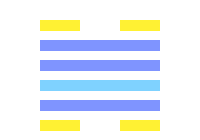
28.1.2.4.5.6 (28 > 22) - THE TÂ KWO HEXAGRAM.
- 1. The first line, divided, shows one placing mats of the white mâo grass under things set on the ground. There will be no error.
- 2. The second line, undivided, shows a decayed willow producing shoots, or an old husband in possession of his young wife. There will be advantage in every way.
- 4. The fourth line, undivided, shows a beam curving upwards. There will be good fortune. If (the subject of it) looks for other (help but that of line one), there will be cause for regret.
- 5. The fifth line, undivided, shows a decayed willow producing flowers, or an old wife in possession of her young husband. There will be occasion neither for blame nor for praise.
- 6. The topmost line, divided, shows its subject with extraordinary (boldness) wading through a stream, till the water hides the crown of his head. There will be evil, but no ground for blame.
28.1.2.4.5.6 (28 > 22) - Bringing a smile back
One comforts the losers by giving them a portion of one's earnings.
Bing DeepL Google Yandex28.1.2.4.5.6 (28 > 22) - Bringing a smile back
One comforts the losers by giving them a portion of one's earnings.
Bing DeepL Google Yandex28.1.2.4.5.6 (28 > 22) - Tá kvoh, le grand excès
Tá kvoh : 1. Grand excès, défaut, manquement ; 2. Traverser, dépasser.
-
1. Ceci est susceptible de deux explications : a. « S’appuyer sur des joncs » est un grand défaut ; ils plient et ne soutiennent pas. b. Pour placer un objet comme natte à offrande, se servir de mao blanc est fautif.
Note. Au lieu de gratter simplement la terre et l’aplanir.
(Le mao blanc représente la pureté, la droiture, kiet tche. Ceci d’après le commentaire représente un excès de précaution. Kwéh hu weï shin (1er sens). - 2.
- 4. Une colonne haute et forte est bonne ; toute autre est dangereuse (opposition à ce qui précède)
- 5. Un vieux saule produisant une fleur, une vieille femme épousant un homme encore jeune, quoique non blâmables, ne peuvent être loués. La fleur du vieux saule ne peut durer, l’époux d’une vieille femme peut s’en dégoûter. (Faits qui passent les règles ordinaires.)
- 6. Traversant un fleuve, y entrer jusqu’au sommet de la tête est chose dangereuse, (mais peut n’être point blâmable, si on le fait pour aider quelqu’un, d’après le Com.) (3e sens). Force défaillante.
28.1.2.4.5.6 (28 > 22) - Rendre le sourire
On réconforte les perdants en leur donnant une partie de ses gains.
Bing DeepL Google Yandex28.1.2.4.5.6 (28 > 22) - Lemondás
- 1. Fejlődni akar a gyengeség miatt.
- 2. Ha valaki nehézségekbe ütközik, emelje fel a leggyengébbet is hogy megőrizhesse jövőjét.
- 4. Mások támogatják de még fel kell épülnie.
- 5. Igyekszik javítani mielőtt mások észrevennék a hanyatlást.
- 6. Egyedül akar haladni a környezők gyengesége miatt.

28.3.4.5.6 (28 > 4) - THE TÂ KWO HEXAGRAM.
- 3. The third line, undivided, shows a beam that is weak. There will be evil.
- 4. The fourth line, undivided, shows a beam curving upwards. There will be good fortune. If (the subject of it) looks for other (help but that of line one), there will be cause for regret.
- 5. The fifth line, undivided, shows a decayed willow producing flowers, or an old wife in possession of her young husband. There will be occasion neither for blame nor for praise.
- 6. The topmost line, divided, shows its subject with extraordinary (boldness) wading through a stream, till the water hides the crown of his head. There will be evil, but no ground for blame.
28.3.4.5.6 (28 > 4) - Admitting that one cannot succeed without help
One knows that others have painful things to confess.
Bing DeepL Google Yandex28.3.4.5.6 (28 > 4) - Admitting that one cannot succeed without help
One knows that others have painful things to confess.
Bing DeepL Google Yandex28.3.4.5.6 (28 > 4) - Tá kvoh, le grand excès
Tá kvoh : 1. Grand excès, défaut, manquement ; 2. Traverser, dépasser.
- 3. Une poutre, un pilier trop faible (voir texte I) sont mauvais (ils ne peuvent supporter) (grand défaut).
- 4. Une colonne haute et forte est bonne ; toute autre est dangereuse (opposition à ce qui précède)
- 5. Un vieux saule produisant une fleur, une vieille femme épousant un homme encore jeune, quoique non blâmables, ne peuvent être loués. La fleur du vieux saule ne peut durer, l’époux d’une vieille femme peut s’en dégoûter. (Faits qui passent les règles ordinaires.)
- 6. Traversant un fleuve, y entrer jusqu’au sommet de la tête est chose dangereuse, (mais peut n’être point blâmable, si on le fait pour aider quelqu’un, d’après le Com.) (3e sens). Force défaillante.
28.3.4.5.6 (28 > 4) - Admettre qu'on ne peut pas réussir sans aide
On sait que les autres ont des choses pénibles à avouer.
Bing DeepL Google Yandex28.3.4.5.6 (28 > 4) - Lemondás
- 3. Ápolja kapcsolatait.
- 4. Mások támogatják de még fel kell épülnie.
- 5. Igyekszik javítani mielőtt mások észrevennék a hanyatlást.
- 6. Egyedül akar haladni a környezők gyengesége miatt.
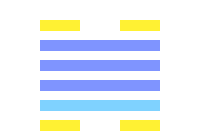
28.1.3.4.5.6 (28 > 41) - THE TÂ KWO HEXAGRAM.
- 1. The first line, divided, shows one placing mats of the white mâo grass under things set on the ground. There will be no error.
- 3. The third line, undivided, shows a beam that is weak. There will be evil.
- 4. The fourth line, undivided, shows a beam curving upwards. There will be good fortune. If (the subject of it) looks for other (help but that of line one), there will be cause for regret.
- 5. The fifth line, undivided, shows a decayed willow producing flowers, or an old wife in possession of her young husband. There will be occasion neither for blame nor for praise.
- 6. The topmost line, divided, shows its subject with extraordinary (boldness) wading through a stream, till the water hides the crown of his head. There will be evil, but no ground for blame.
28.1.3.4.5.6 (28 > 41) - Losing one's essence
One studies carefully the causes of one's decline.
Bing DeepL Google Yandex28.1.3.4.5.6 (28 > 41) - Losing one's essence
One studies carefully the causes of one's decline.
Bing DeepL Google Yandex28.1.3.4.5.6 (28 > 41) - Tá kvoh, le grand excès
Tá kvoh : 1. Grand excès, défaut, manquement ; 2. Traverser, dépasser.
-
1. Ceci est susceptible de deux explications : a. « S’appuyer sur des joncs » est un grand défaut ; ils plient et ne soutiennent pas. b. Pour placer un objet comme natte à offrande, se servir de mao blanc est fautif.
Note. Au lieu de gratter simplement la terre et l’aplanir.
(Le mao blanc représente la pureté, la droiture, kiet tche. Ceci d’après le commentaire représente un excès de précaution. Kwéh hu weï shin (1er sens). - 3. Une poutre, un pilier trop faible (voir texte I) sont mauvais (ils ne peuvent supporter) (grand défaut).
- 4. Une colonne haute et forte est bonne ; toute autre est dangereuse (opposition à ce qui précède)
- 5. Un vieux saule produisant une fleur, une vieille femme épousant un homme encore jeune, quoique non blâmables, ne peuvent être loués. La fleur du vieux saule ne peut durer, l’époux d’une vieille femme peut s’en dégoûter. (Faits qui passent les règles ordinaires.)
- 6. Traversant un fleuve, y entrer jusqu’au sommet de la tête est chose dangereuse, (mais peut n’être point blâmable, si on le fait pour aider quelqu’un, d’après le Com.) (3e sens). Force défaillante.
28.1.3.4.5.6 (28 > 41) - Perdre son essence
On étudie avec attention les causes de sa déchéance.
Bing DeepL Google Yandex28.1.3.4.5.6 (28 > 41) - Lemondás
- 1. Fejlődni akar a gyengeség miatt.
- 3. Ápolja kapcsolatait.
- 4. Mások támogatják de még fel kell épülnie.
- 5. Igyekszik javítani mielőtt mások észrevennék a hanyatlást.
- 6. Egyedül akar haladni a környezők gyengesége miatt.
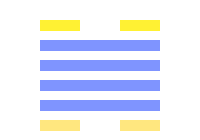
28.2.3.4.5.6 (28 > 23) - THE TÂ KWO HEXAGRAM.
- 2. The second line, undivided, shows a decayed willow producing shoots, or an old husband in possession of his young wife. There will be advantage in every way.
- 3. The third line, undivided, shows a beam that is weak. There will be evil.
- 4. The fourth line, undivided, shows a beam curving upwards. There will be good fortune. If (the subject of it) looks for other (help but that of line one), there will be cause for regret.
- 5. The fifth line, undivided, shows a decayed willow producing flowers, or an old wife in possession of her young husband. There will be occasion neither for blame nor for praise.
- 6. The topmost line, divided, shows its subject with extraordinary (boldness) wading through a stream, till the water hides the crown of his head. There will be evil, but no ground for blame.
28.2.3.4.5.6 (28 > 23) - Stealing one's reputation
One is taking credit for something that belongs to someone else.
Bing DeepL Google Yandex28.2.3.4.5.6 (28 > 23) - Stealing one's reputation
One is taking credit for something that belongs to someone else.
Bing DeepL Google Yandex28.2.3.4.5.6 (28 > 23) - Tá kvoh, le grand excès
Tá kvoh : 1. Grand excès, défaut, manquement ; 2. Traverser, dépasser.
- 2.
- 3. Une poutre, un pilier trop faible (voir texte I) sont mauvais (ils ne peuvent supporter) (grand défaut).
- 4. Une colonne haute et forte est bonne ; toute autre est dangereuse (opposition à ce qui précède)
- 5. Un vieux saule produisant une fleur, une vieille femme épousant un homme encore jeune, quoique non blâmables, ne peuvent être loués. La fleur du vieux saule ne peut durer, l’époux d’une vieille femme peut s’en dégoûter. (Faits qui passent les règles ordinaires.)
- 6. Traversant un fleuve, y entrer jusqu’au sommet de la tête est chose dangereuse, (mais peut n’être point blâmable, si on le fait pour aider quelqu’un, d’après le Com.) (3e sens). Force défaillante.
28.2.3.4.5.6 (28 > 23) - Voler sa réputation
On usurpe un mérite qui revient à quelqu'un d'autre.
Bing DeepL Google Yandex28.2.3.4.5.6 (28 > 23) - Lemondás
- 2. Ha valaki nehézségekbe ütközik, emelje fel a leggyengébbet is hogy megőrizhesse jövőjét.
- 3. Ápolja kapcsolatait.
- 4. Mások támogatják de még fel kell épülnie.
- 5. Igyekszik javítani mielőtt mások észrevennék a hanyatlást.
- 6. Egyedül akar haladni a környezők gyengesége miatt.
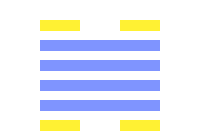
28.1.2.3.4.5.6 (28 > 27) - THE TÂ KWO HEXAGRAM.
- 1. The first line, divided, shows one placing mats of the white mâo grass under things set on the ground. There will be no error.
- 2. The second line, undivided, shows a decayed willow producing shoots, or an old husband in possession of his young wife. There will be advantage in every way.
- 3. The third line, undivided, shows a beam that is weak. There will be evil.
- 4. The fourth line, undivided, shows a beam curving upwards. There will be good fortune. If (the subject of it) looks for other (help but that of line one), there will be cause for regret.
- 5. The fifth line, undivided, shows a decayed willow producing flowers, or an old wife in possession of her young husband. There will be occasion neither for blame nor for praise.
- 6. The topmost line, divided, shows its subject with extraordinary (boldness) wading through a stream, till the water hides the crown of his head. There will be evil, but no ground for blame.
28.1.2.3.4.5.6 (28 > 27) - Offering a wide variety
One completes one's creation with touches of different colors.
Bing DeepL Google Yandex28.1.2.3.4.5.6 (28 > 27) - Offering a wide variety
One completes one's creation with touches of different colors.
Bing DeepL Google Yandex28.1.2.3.4.5.6 (28 > 27) - Tá kvoh, le grand excès
Tá kvoh : 1. Grand excès, défaut, manquement ; 2. Traverser, dépasser.
-
1. Ceci est susceptible de deux explications : a. « S’appuyer sur des joncs » est un grand défaut ; ils plient et ne soutiennent pas. b. Pour placer un objet comme natte à offrande, se servir de mao blanc est fautif.
Note. Au lieu de gratter simplement la terre et l’aplanir.
(Le mao blanc représente la pureté, la droiture, kiet tche. Ceci d’après le commentaire représente un excès de précaution. Kwéh hu weï shin (1er sens). - 2.
- 3. Une poutre, un pilier trop faible (voir texte I) sont mauvais (ils ne peuvent supporter) (grand défaut).
- 4. Une colonne haute et forte est bonne ; toute autre est dangereuse (opposition à ce qui précède)
- 5. Un vieux saule produisant une fleur, une vieille femme épousant un homme encore jeune, quoique non blâmables, ne peuvent être loués. La fleur du vieux saule ne peut durer, l’époux d’une vieille femme peut s’en dégoûter. (Faits qui passent les règles ordinaires.)
- 6. Traversant un fleuve, y entrer jusqu’au sommet de la tête est chose dangereuse, (mais peut n’être point blâmable, si on le fait pour aider quelqu’un, d’après le Com.) (3e sens). Force défaillante.
28.1.2.3.4.5.6 (28 > 27) - Décliner une gamme
On parachève sa création par des touches de différentes couleurs.
Bing DeepL Google Yandex28.1.2.3.4.5.6 (28 > 27) - Lemondás
- 1. Fejlődni akar a gyengeség miatt.
- 2. Ha valaki nehézségekbe ütközik, emelje fel a leggyengébbet is hogy megőrizhesse jövőjét.
- 3. Ápolja kapcsolatait.
- 4. Mások támogatják de még fel kell épülnie.
- 5. Igyekszik javítani mielőtt mások észrevennék a hanyatlást.
- 6. Egyedül akar haladni a környezők gyengesége miatt.

